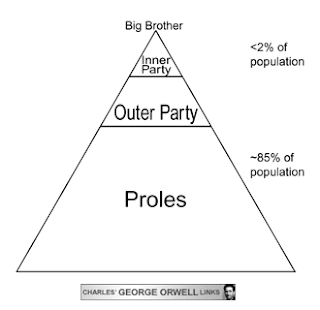Dystopia (n.): a work of fiction describing an imaginary
place where life is extremely bad because of deprivation or oppression or
terror, typically a totalitarian one.
1984 is my first non-YA dystopia. Sure there are some good
YA dystopias out there like The Hunger Games or Unwind. But that doesn’t change
the fact that in YA you know where the story is going: our heros will rebel,
our heros will either save everyone or at least themselves, our heros will defy
or defeat the evil that oppresses them. There is invariably always an out, and
you come to expect and await the rising of the people. YES OKAY, we’ve seen it
all over and over. It’s like a broken cassette tape at this point.
1984 is a dystopia, but it is definitely not a YA dystopia. And
thank god for that!
The Synopsis I found on Goodreads:
Written in 1948, 1984 was
George Orwell's chilling prophecy about the future. And while the year 1984 has
come and gone, Orwell's narrative is timelier than ever. 1984 presents
a startling and haunting vision of the world, so powerful that it is completely
convincing from start to finish. No one can deny the power of this novel, its
hold on the imaginations of multiple generations of readers, or the resiliency
of its admonitions. A legacy that seems only to grow with the passage of time.
Points to know:
- Winston, our main character, lives in a future London ("future" considering the book was written in 1948) which is controlled by a
group called The Party.
- There is the Inner Party and the Outer Party; Inner being
the powerful one that has the real control. Then there’s the Proles
(Proletariat) at the bottom of the food chain.
- Winston is part of the Outer Party; he works a desk job at the Ministry of Truth.
- The Party demands the complete submission of its people,
body and mind; one is not allowed to have a rebellious thought. If he does, the
Thought Police will find him, and destroy him.
- Let’s just say Winston is being a very bad citizen, he
thinks for himself and he hates the Party.
- We follow Winston through his struggles.
I’m going to tell you a story I thought of as I was reading this book.
Once upon a time there was a king and a queen ruling over a prosperous village.
All the villagers loved and admired them for they ruled fairly and competently.
But one day, a spiteful witch poisoned the village well with a potion that
turns all who drink from it mad. The king and the queen were unaffected because they
drank from a different well, one that was not poisoned. Great sorrow hit them
as they found out that their villagers now lived in their own world, leaving
them alone in the real world. Their rulings were no longer considered fair, and
they were considered wise no more by their people. They became the ones who are
insane in the eyes of everyone. So the king and queen decided to drink from the cursed well to join the people in their new reality. And so they went mad, and all was right again
within the kingdom; and the king and queen regained the respect and devotion of
their people.
Would you have made the same decision as the king and queen?
Would you have gone with the flow? Or gone upstream, desperately clinging to
your sanity?
Winston goes through a similar struggle. Should he cling to
what he knows is reality? Should he search for the truth concerning the past? Or
should he go with the flow, accepting all the lies, and not risk getting discovered?
You don’t know what to think in this book, and that’s
because you can never really be sure of the extent of the Party’s power. Do
they really see everything? Is the saying “Big Brother is watching you.”
just for show? You may or may not find out.
1984 talks about many interesting themes, like the way
technology can be used for destructive purposes – which isn't really new today,
but this book was written before computers where fully developed, so you can see the
extent of Orwell’s foresight. He shows it through something called the Telescreen,
which releases a stream of endless propaganda while simultaneously spying
on anyone within its range. It provides audio and video feed to the
Though Police, which is responsible for monitoring all Party members.
It shows the human mind as a fickle, controllable little piece
of putty,
manipulated and deceived into believing anything and everything fed to it by
its controllers. The purpose of that deception is to perpetuate the existence
of The Party forever. This concept pushes the people to defy logic, to apply
something called doublethink. Doublethink is explained in the book as follows:
"Doublethink means the power of holding two contradictory beliefs in one's mind simultaneously, and accepting both of them"
Orwell explores the way war is used as a distracting for the
people, as a way to explain why the standard of living is so low. War is a
stepping stone to reach power. There is no reason to it beyond the conquest of
power, beyond greed and human arrogance.
He also raises philosophical little points:
If reality is only seen through the mind, who’s to say what’s
real and what’s not? If everyone sees the same thing, does it matter that it’s
not actually there? What is the outside world really, if it is seen through a
distorted view by everyone? Imagine everyone is wearing yellow-tinted glasses
and is trained to NEVER take off those glasses. Then everyone sees the world in
shades of yellow. The reality becomes that the world is indeed in different
shades of yellow. If reality is what you see, and what you see can be affected
by the mind, then does he who controls the mind, control reality?
And what if someone were to take off those glasses. Would anyone believe him? Would he even dare speak the truth?
Similarly, here's a quote from the book:
"He who controls the past controls the future. He who controls the present controls the past."
If someone controls what people believe is the past, he can make it out to be a horrendous travesty of what it actually was, and then claim improvement when the world is actually declining. So if you destroy all records of the past, substituting them with your own versions, and memory is no longer reliable, then does the past exist the way it happened, or the way you said it happened?
1984 serves a different purpose than what I’ve been reading.
It aims to educate, it’s meant as an eye-opener. It warns of the dangers of
giving others power and trusting them to do right by you; totalitarian systems
are one's enemy, and one must avoid them at all costs.
Orwell meant the book as a
warning against communism in a time when it was being seriously contemplated. Also, it warns you to think; to look beyond your
short little noses, to see the world around you for what it really is through
your own eyes. The book says: Think for yourselves and don’t let anyone have power over you.
And who’s to say we are not today the sheep-like people
described in Orwell’s book? Propaganda is such a basic part of our lives, that
most don’t even notice it anymore. Who’s to say we are not manipulated into
thinking what we think, and living the way we live? Who’s to say we aren’t too
distracted by our miserable lives to realize something crucial?













